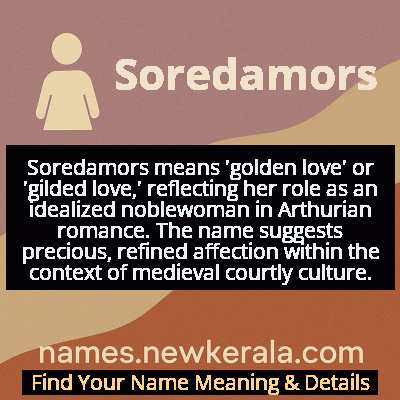Soredamors Name Meaning & Details
Origin, Popularity, Numerology Analysis & Name Meaning of Soredamors
Discover the origin, meaning, and cultural significance of the name SOREDAMORS. Delve into its historical roots and explore the lasting impact it has had on communities and traditions.
Name
Soredamors
Gender
Female
Origin
Arthurian
Lucky Number
1
Meaning of the Name - Soredamors
Soredamors means 'golden love' or 'gilded love,' reflecting her role as an idealized noblewoman in Arthurian romance. The name suggests precious, refined affection within the context of medieval courtly culture.
Soredamors - Complete Numerology Analysis
Your Numerology Number
Based on Pythagorean Numerology System
Ruling Planet
Sun
Positive Nature
Leaders, ambitious, highly driven, self-reliant, innovative.
Negative Traits
Overly aggressive, domineering, impatient, selfish.
Lucky Colours
Red, orange, gold.
Lucky Days
Sunday.
Lucky Stones
Ruby, garnet.
Harmony Numbers
2, 3, 9.
Best Suited Professions
Entrepreneurs, managers, engineers.
What People Like About You
Courage, determination, leadership.
Famous People Named Soredamors
Soredamors
Arthurian noblewoman
Sister of Sir Gawain and wife of Sir Alexander in Arthurian legend
Soredamors (literary)
Literary character
Central romantic figure in Chrétien de Troyes' 'Cligés'
Soredamors (modern adaptation)
Fictional character
Appears in various modern Arthurian retellings and fantasy novels
Name Variations & International Equivalents
Click on blue names to explore their detailed meanings. Gray names with will be available soon.
Cultural & Historical Significance
The character reflects the sophisticated court culture of 12th-century France, where concepts of courtly love were being refined and codified. Soredamors embodies the ideal of the noblewoman who navigates the complex interplay between personal desire and social obligation. Her story demonstrates how romantic relationships functioned within the framework of feudal society, where marriages served political purposes but also allowed for genuine emotional connection. Through her character, Chrétien explores the psychological dimensions of love and the challenges faced by women of high birth in pursuing both personal happiness and dynastic duty.
Extended Personality Analysis
Soredamors is characterized by a complex blend of aristocratic refinement, emotional intensity, and practical intelligence. As a noblewoman in Arthur's court, she possesses the grace, education, and social awareness expected of her station, yet she demonstrates remarkable emotional depth and personal agency. Her experience of love for Alexander reveals a woman capable of profound passion and loyalty, but also one who understands the political realities of her position. She navigates her romantic feelings with a combination of vulnerability and strategic thinking, showing how medieval noblewomen had to balance personal desire with social expectations.
Her personality reflects the ideals of courtly love literature—she is beautiful, virtuous, and inspires knightly devotion, yet she also exhibits inner strength and moral complexity. The narrative portrays her as experiencing love as both a transformative force and a source of internal conflict, particularly as she reconciles her feelings with her responsibilities as Gawain's sister and a member of Camelot's elite. This psychological depth makes her one of the more nuanced female characters in early Arthurian literature, representing a bridge between the idealized women of earlier romances and the more fully realized female characters that would appear in later Arthurian tradition.
Modern Usage & Popularity
In contemporary contexts, Soredamors remains predominantly a literary and historical name rather than a practical choice for modern naming. Its usage is almost exclusively confined to Arthurian scholarship, historical fiction, and fantasy literature where authors seek authentic medieval names with strong Arthurian connections. The name's archaic French construction and association with 12th-century romance make it challenging for everyday use in most English-speaking countries. However, it occasionally appears in specialized contexts such as Renaissance fairs, historical reenactments, or among parents with deep interests in medieval literature seeking unique names with rich cultural heritage. The name's complexity and specific historical associations limit its broad appeal, though it maintains a niche presence in Arthurian-focused communities and creative works that draw inspiration from medieval romance traditions.
Symbolic & Spiritual Meanings
Symbolically, Soredamors represents the golden ideal of courtly love—a concept that values refined affection, emotional sophistication, and the transformative power of romantic devotion within aristocratic society. The 'golden' or 'gilded' quality suggested by her name symbolizes love that is both precious and potentially artificial, reflecting how courtly romance often involved performative elements alongside genuine emotion. She embodies the medieval ideal of the noblewoman as both an object of desire and an active participant in the cultural rituals of love. Her character symbolizes the bridge between personal passion and social obligation, illustrating how romantic relationships in medieval aristocracy served both individual fulfillment and political purposes. The name also carries connotations of inheritance and continuity, as her union with Alexander produces Cligés, ensuring the transmission of courtly values to the next generation.

